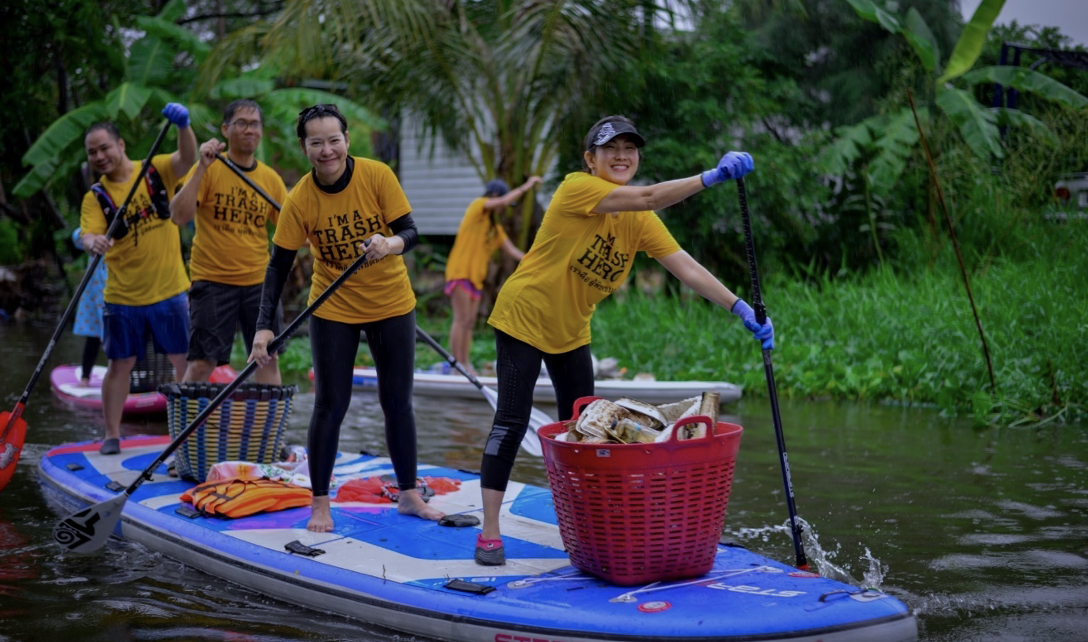Context:
Thailand is one of the many countries in Asia and the Pacific that are experiencing issues of waste management and plastic pollution. Waste mismanagement has led to an epidemic of plastic pollution in Bangkok. This is due to the over-usage and production of plastic and plastic bags, lack of attention and awareness on recycling, as well as lack of investment in the waste management sector. These issues have ultimately led to large amounts of waste being uncollected across the city and in the Chao Phraya River (that runs through Bangkok). However, initiatives are being created and implemented to tackle this concerning problem.
Implementation of programme/ initiative:
Trash Hero Bangkok was founded in May 2016 and is a non-profit association, with funding being provided from grants, donations and sponsors. Members of local communities under the Trash Hero Bangkok initiative meet every week to conduct clean-ups, whereby volunteers collect litter around different locations across the city. Cleaning materials, gloves and refreshments are provided to those that volunteer, and there is no cost or sign-up needed for people to participate and contribute. Clean-up events take place in multiple locations, including Bangplee, Taco Lake, Makkasan Lake, Bangkachao and Laem Mae Phim. The overall objective of Trash Hero Bangkok is to create “a clean and sustainable future for Bangkok” through “sustainable, community-based projects that remove existing waste and reduce future waste by inspiring long-term behaviour change”. The aim of consistently collecting the litter in Bangkok is to reduce the amount of plastic pollution harming the health and the environment of the city and its inhabitants. Activities are aligned with and committed to 7 of the United Nations Sustainable Development Goals (good health (Goal 3); quality education (Goal 4); decent work and economic growth (Goal 8); sustainable cities and communities (Goal 11); responsible consumption (Goal 12); climate action (Goal 13); and life below water (Goal 14).
Main challenges:
Although the clean-ups provide valuable education for communities that may be unaware of the impacts caused by waste on the oceans and people’s health, they do not solve the problem of plastic pollution at the source. Volunteers separate the trash and give any recyclable material found to the local municipality or professional waste management companies. However, in many parts of Bangkok there is a limited amount of recycling being conducted, with incineration remaining as the only option for disposing non-recyclable and non-compostable waste.
Results achieved:
As of September 2023, there have been 189 clean-ups across Bangkok. An overall total of 39,000 kilograms of trash has been collected from the clean-up events, alongside 810 kilograms of recycled plastic. Among all the clean-up events in Bangkok, there has been a total of 4,500 volunteers, with 590 of those being youth. The youth and communities have benefitted from the workshops provided in schools. Through educating communities on the impact that plastic pollution has on the environment, the initiative aims to reduce the flow of litter as people formulate new methods to utilize trash rather than burning it. Starboard, a supporter of Trash Hero Bangkok, create recycled stand-up paddle boards called, “eco boards”. Expanded polystyrene recovered from beach clean-ups across Thailand are used in making new stand-up paddle and windsurf boards, and Tlejourn creates recycled flipflops from the materials collected at the clean-ups. Moreover, “Ecobricks” are made from plastic bottles packed with non-biological waste and are being used to build a new school building at an orphanage in Kanchanaburi province.
Moving Forward:
Trash Hero Thailand covers 21 different locations, further highlighting the replicability of this initiative. Since beginning in Thailand, Trash Hero now consists of 116 official chapters in 15 countries, namely, Cambodia, Czech Republic, Germany, Indonesia, Japan, Kuwait, Malaysia, Myanmar, The Netherlands, Poland, Serbia, Singapore, Switzerland, Thailand and Viet Nam. The organization is currently working on expanding to additional countries across Asia and the Pacific, as well as the entire world. In addition to conducting hands-on workshops and events with communities, Trash Hero is “committed to collecting data that can be used to influence policy change on plastic” as well as inspiring the next generation of activists.
Replicability:
Trash Hero Bangkok acts as an ideal model for environmental preservation and sustainable development. It also highlights the importance of spreading awareness of waste collection methods and ultimately stopping plastic pollution. Countries can replicate and learn from this initiative through motivating communities to engage in cleaning the environment and to create new and useful sustainable projects from collecting plastic waste.
References:
- https://trashhero.org/network/trash-hero-bangkok/
- https://trashhero.org/where-does-the-trash-go/
- https://mahanakornpartners.com/smart-cities-in-thailand/
This good practice was kindly prepared by Mr. Jacob Simcox
Project Details
Date: November 10, 2023
